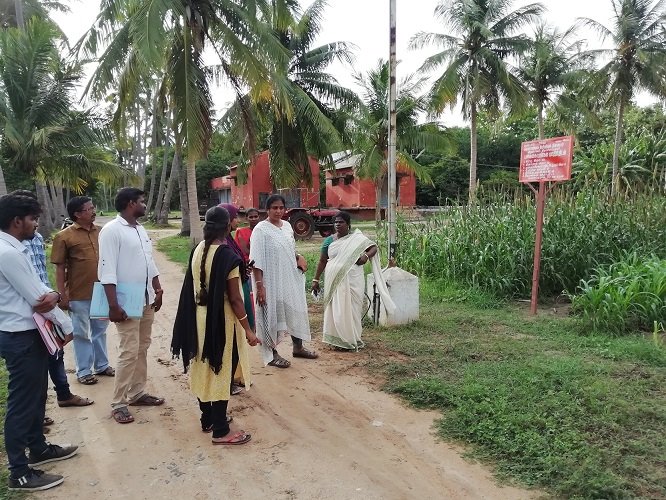Cycle 8 (2019 Deadline)
Collaborative adaptation pathways for agricultural water management in the Bhavani Basin, India (Co-Adapt)
PI: Geethalakshmi Vellingiri (geetha@tnau.ac.in), Tamil Nadu Agricultural University
U.S. Partner: Venkataramana Sridhar, Virginia Polytechnic Institute and State University
Project dates: December 2019 - May 2022
Project Overview:
 | | The project team holds a discussion with local villagers (photo courtesy of Dr. Geethalakshmi). |
Agricultural development in Tamil Nadu faces significant challenges due to water scarcity caused by recurrent droughts, increasingly attributed to climate change. This PEER study aimed to recommend adaptation strategies to manage climate risks in the agricultural sector of the Bhavani River basin in Tamil Nadu. Led by Dr. Vellingiri and her team, the study employed CRIDA (Climate Risk Informed Decision Analysis), integrating decision scaling and bottom-up vulnerability approaches in collaborative planning to develop adaptation pathways. CRIDA facilitated the identification of critical thresholds in the agricultural system, assessed future climate impacts, and proposed multiple adaptation options tailored to diverse climate scenarios. Central to the study was a stakeholder consultation process to refine adaptation pathways, providing policymakers with actionable insights for timely interventions. The study aimed to enhance food security by proposing adaptive measures aligned with the needs of farmers and stakeholders, thereby increasing the likelihood of their implementation. The approach used in this study is expected to have the potential to be replicated at other river basins and sectors offering a framework for proactive climate adaptation planning and policy development.
Final Summary of Project Activities
The PEER team members first identified, through conversations with stakeholders, performance objectives and metrics relevant to agricultural department officers and irrigation officers. They then developed a risk matrix by categorizing the risks as low, medium, and high, based on the performance metrics and the plausibility.
The researchers used these metrics while modeling the Lower Bhavani irrigation system using the ArcSWAT and Aquacrop models. They conducted a stress test using the water resources system model to examine how system performance responds to changes in climatic stressors. The stressors considered the range of change in climatic variables such as precipitation and temperature. The system was stressed to understand the response to 168 possible future climate conditions, involving a unique combination of changes in precipitation, temperature, and coefficient of variation. The PEER group analyzed the system performance under various combinations, including the aridity index, which incorporates changes in precipitation and temperature, and climate variability, as indicated by the coefficient of variation of precipitation.
Four adaptation options were identified, all related to demand management or conservation strategies. The options tested included aerobic rice cultivation, alternate wetting and drying, deficit irrigation, and delaying the transplanting of paddy by one month. All these alternative options were also subjected to stress testing using the same system model and were tested for the response in supply-demand ratio. The researchers found the pathway of delayed transplanting had least cost and maximum target benefits associated with it, if implemented as a demand management measure.
The team published their findings in a journal article and presented on risk-informed adaptation in agriculture and bottom-up approach to agricultural water management at two events in Kerala. The PI and her colleagues have received three additional grants to continue related work worth a total of $1.2 million.
Publication
Ambili G. Kamalamma, Mukand S. Babel, Venkataramana Sridhar, and Geethalakshmi Vellingiri. 2023. A novel approach to vulnerability assessment for adaptation planning in agriculture: An application to the Lower Bhavani Irrigation Project, India. Climate Services 30: 100358. https://doi.org/10.1016/j.cliser.2023.100358
Back to PEER Cycle 8 Grant Recipients
| 



